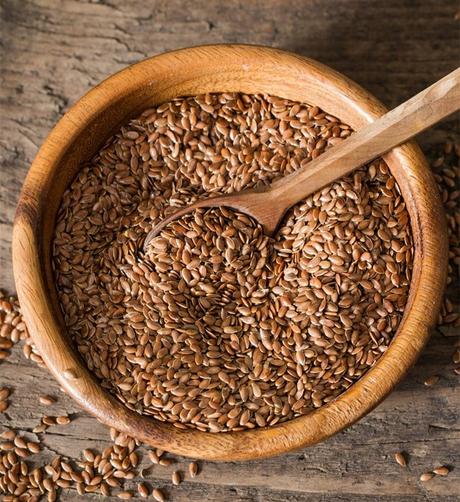
Flaxseed, also called linseed, is a nutrient-rich seed. It has a deliciously nutty flavor and a wonderful crunch. Flaxseed is a very versatile ingredient, so you can use it as a thickener (when mixed with water) or as a nutty binder or crust in just about every vegan and vegetarian dish. It's also high in nutritional benefits, making it a wonderful ingredient to add to your diet.
If you don't have flaxseeds or simply don't want to cook with them, try using these flax seed substitutes to get similar nutritious benefits and incredible flavor in your diet.
1. Chia Seeds
Chia seeds and flax seeds share a lot of similarities. They both contain soluble fibers mucilage and omega-3 fatty acids and work well as thickening and binding agents. Chia seeds are a superfood prized for their versatility, so you're sure to have plenty of culinary choices to try.
The mild-flavored chia seeds can be used to replace flax seeds in desserts as well as savory dishes like soups and gravies without compromising the flavor or texture of the dish. However, keep in mind that chia seeds start to become gelatinous very quickly when exposed to moist environments. So, it may not work for salads and other recipes that tend to go bad with excess moisture.
Substitute in a 1:1 ratio (when using dry to sprinkle over soups and cereals), when substituting for egg in baking recipes, add 3 tablespoons of water to 1 tablespoon of ground chia seeds to substitute for a flax egg.
2. Hemp Seeds
Don't worry, hemp seeds may come from the same plant family as the high-inducing cannabis plant but the seeds are super legal to use. They contain all 20 amino acids, omega-3 fatty acids, fat, and proteins and are low in carbohydrates and fiber. Hemp seeds have a nutty flavor similar to flax seeds, which makes them the perfect stand-in for the original ingredient.
Hemp seeds give dishes a nutty flavor and have a softer outer covering, so they will not only add a wonderful flavor to the dish but also make it easier to digest. You can use hemp seeds in the same way as flaxseeds but bear in mind that they do not contain mucilage, the binding agent, so won't be suitable to use as an egg substitute.
Substitute in a 1:1 ratio.
3. Wheat Germ
Wheat germ comes from the wheat kernel and offers an impressive variety of nutrients like fiber, vitamins B and E, and minerals as well as omega 3 fatty acids. It's excellent for your immune system and acts as a preventative measure against heart disease and inflammation.
You can use wheat germ to replace flax seed in a range of meals, including cereals and smoothies. It is wonderful to use in bread recipes, allowing you to enjoy a fluffy baked delight without adding any carbs or gluten. Bear in mind that wheat germ will add its distinct flavor and grainy, rough texture to the bread, so if that doesn't appeal to you, feel free to explore other options.
Substitute in a 1:1 ratio.
4. Psyllium Seeds
Psyllium seeds are notably rich in fiber, similar to flaxseed, which makes them a wonderful replacement for the original ingredient. It's also gelatinous and beneficial for your gastrointestinal tract, making it a good nutritious option to add to your diet.
You can use psyllium seeds in smoothies, juices, and gluten-free baking recipes. It will make your meal highly filling and satisfying, which will also help cut down snack breaks to curb overeating. However, bear in mind that psyllium seeds aren't as nutritious as flaxseed, so they won't be as good for your health as the original ingredient.
Substitute in a 1:1 ratio.
5. Almond Meal
Almond meal is made by grinding almonds into a fine, flour-like powder. It is packed with protein, fiber, and healthy fats and can be used as a great egg substitute as well as a thickening and binding agent. Almond meal can thus make a wonderful protein-rich alternative to flaxseeds.
You can add almond meal to bread, pastries, cakes, and other baked goods. It also works well as a food binder and a thickener for stews, soups, and other liquid-based dishes. It's such a wonderful ingredient that you can even use it in place of cornstarch and other thickeners to produce a nutrient-rich dish. It's also much easier to find, which is a big plus.
Substitute in a 1:1 ratio.
6. Yogurt
Yogurt is one of those dairy products that finds its place in just about every moisture-rich recipe. It's fairly neutral in flavor and is a great ingredient to use for binding different ingredients together. It is also pretty helpful for your digestive system, which makes it a healthy flaxseed substitute.
You can use yogurt to replace flaxseed in a range of recipes, but it works best in baked goods. While there are plenty of other flavors available, it's best you use plain yogurt to keep the flavor neutral and not overpower the other flavors in your dish. However, if you're making peach, mango, or strawberry-flavored foods, you can use the same flavor of yogurt to make the dish more appealing.
1 teaspoon flaxseed/flax egg = 4 tablespoons of plain yogurt.
7. Tofu
Tofu is made from soybeans and is rich in nutrients. It has excellent binding properties and can be used to replace flaxseed in recipes that require a binding agent. While it tastes quite bland and has hints of sourness, it makes for a great addition to savory and dessert recipes.
Tofu is good to use as a topping as well as a primary ingredient. Its binding properties make it perfect to use in smoothies and soups, and it can even replace meat in dishes without taking away its protein content. Use plain tofu to boost your dish's nutritional content without detracting from its overall flavor.
1 tablespoon ground flaxseeds = 1/4 cup plain, blended silken tofu.
